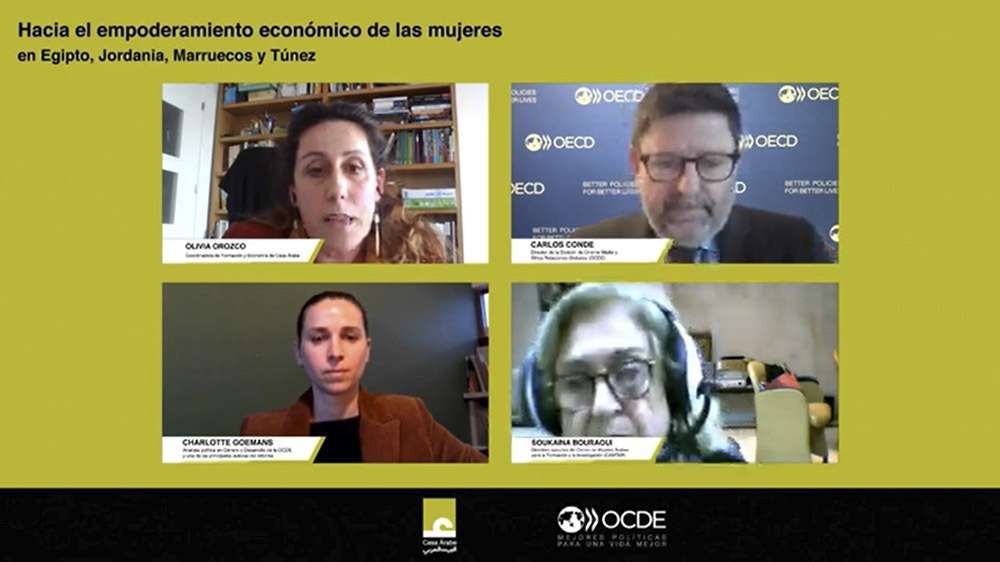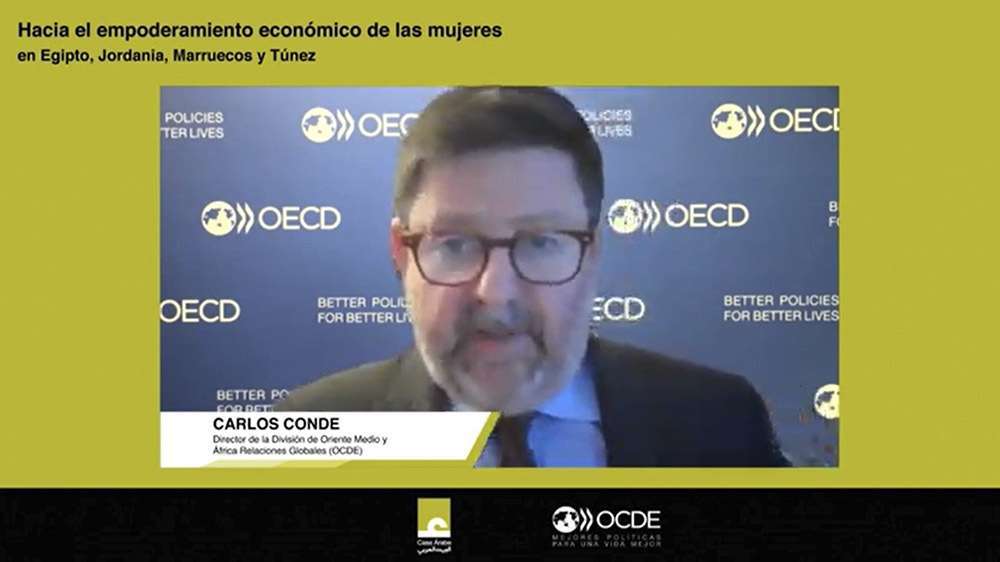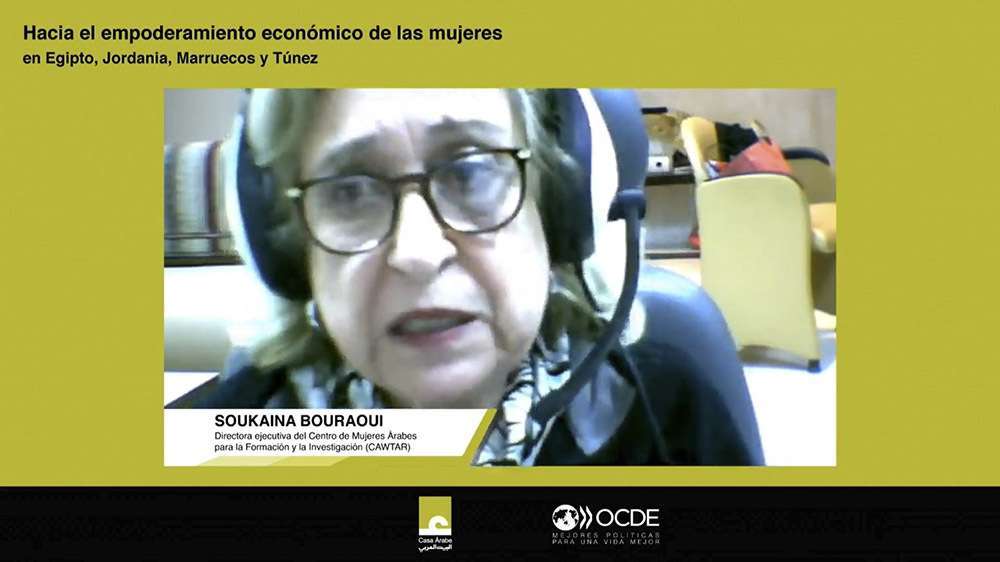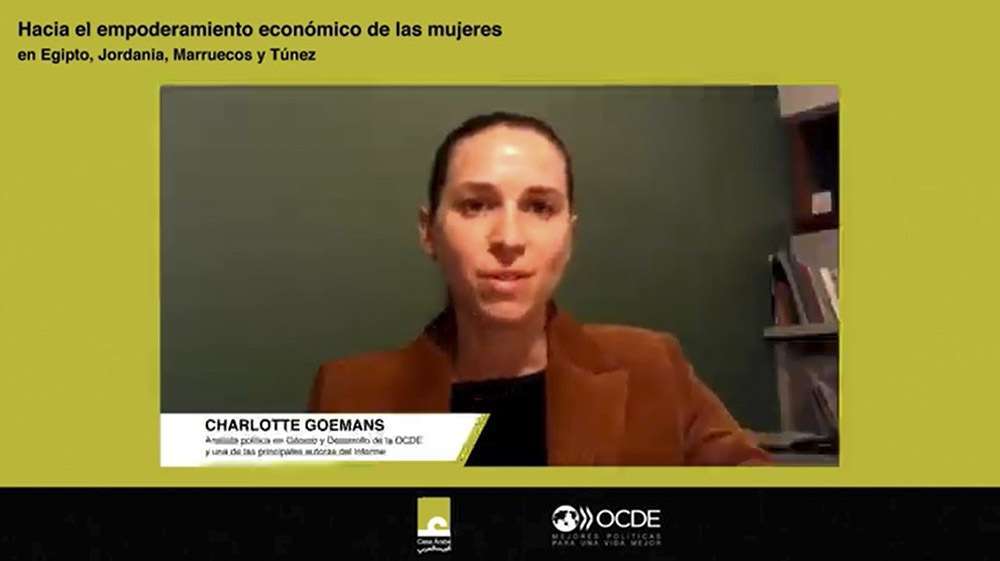El camino hacia el empoderamiento económico de las mujeres en Egipto, Jordania, Marruecos y Túnez

In Middle Eastern and North African countries, it is estimated that GDP could increase by $2.7 trillion by 2025 if women were allowed to play an equal role to men in the labor market.
The backlash generated by the already existing gender wage gap and the economic crisis generated by the pandemic lead to a steady reversal and failure to break down the barriers limiting women's participation.
The latest OECD report, published in November under the title 'Changing Laws and Breaking Barriers for Women's Economic Empowerment in Egypt, Jordan, Morocco and Tunisia' (published in English, Arabic and French), highlights some of the legislative, policy and institutional reforms introduced in Egypt, Jordan, Morocco and Tunisia in support of women’s economic empowerment.
To present its results and action proposals, Casa Arabe invited the guest speakers Carlos Conde, Head of the Middle East and Africa Division (OECD Global Relations Secretariat), Soukaina Bouraoui, Executive Director of the Center of Arab Women for Training and Research (CAWTAR), and Charlotte Goemans, a policy analyst in Gender and Development at the OECD and one of the main authors of the report. The event will be conducted by Olivia Orozco, Casa Árabe’s Training and Economic Coordinator.

The report precedes the COVID-19 crisis as the situation is now much better than before the analyses. "Progress and achievements at the legislative level have ratified international standards, different conventions, constitutions," said Charlotte Goemans. She noted that there have been initiatives for labour equality, women's participation in social dialogue. We found a remarkable improvement and key actions at the moment.
We need to involve the private sector, capacity building and it is important to review the laws. For example, the duty of obedience, which hinders women's participation in the labour market, as well as inheritance, violence towards women and children, an element that has increased during the pandemic, as pointed out in the Casa Árabe talk.

These populations are very young with a very large demographic increase, in an economic model that has difficulties in creating employment. Since there is a predominance of public employment and there is a private sector that fails to grow, it is limited and small. "Active women in MENA countries represent half of the world percentage, 20% instead of 48%, double discrimination", Carlos Conde underlined.
This change is on the right track, but everyone has a contribution to make; however, not everyone wants to do it. You can take a good practice from one country and bring it to others, it has nothing to do with importing something from Norway to China, but from Saudi Arabia to Morocco, for example. This is something we have been trying to do for 15 years, we have to make reforms and continue working so that these reforms can be adopted in other countries, as explained.

All countries have flaws, not just Arab and North African countries, although other countries have closed loopholes that Arab countries have not closed. "As today you can land on Mars, we can close those gaps," said Soukaina Bouraoui.
There are mechanisms in the political arena to increase women's participation, but only 11% of parliamentarians in the region are women. Regarding the private sector, it depends from one country to another, but there are few entrepreneurs in Tunisia, for example, entrepreneurship is a key driver and is lagging far behind in these countries.
Digitalisation is also behind in these countries. COVID-19 has shown that the poor have been totally marginalised and poor women are totally forgotten.
We often talk as if everything is going very well in terms of cooperation, but when it comes to where the money comes from, if there is no transparency in the country receiving the money, then that money is of no use. Women need access to information and good governance, as was pointed out.

As long as the status is not equal in private life, it will have an impact on public life. There is no equality and this needs to be corrected by working on the laws in the private sphere.
There is no going backwards in the matter of laws regarding women, because politicians will not dare to go backwards and new unequal laws will not be made. "Those in power pretend not to listen, but they do listen". Civil society, especially women's civil society, is present and has a lot of experience and will not allow itself to go backwards. For instance, in the case of the Tunisian Constitution, as was explained at the Casa Árabe event.
Soukaina Bouraoui pointed out that the new challenges are the three shocks: the Arab Spring, climate change, which is going to affect us even more in both the northern and southern Mediterranean, and COVID-19, which will force a new path.
Also, we will have to fight against the huge cultural persistence and stereotypes, there has to be a "counter-culture" that has a discourse as seductive as the nostalgic one. Another factor that needs to be changed is illiteracy. As well as the difficulty of legal assistance to help vulnerable women, which is an obstacle to the advancement of women's inclusion.
All the gains and achievements have remained intact despite the global pandemic and the crisis it has brought. However, this is not to say that there is not much to be done in the region to achieve gender equality in the economic framework.










